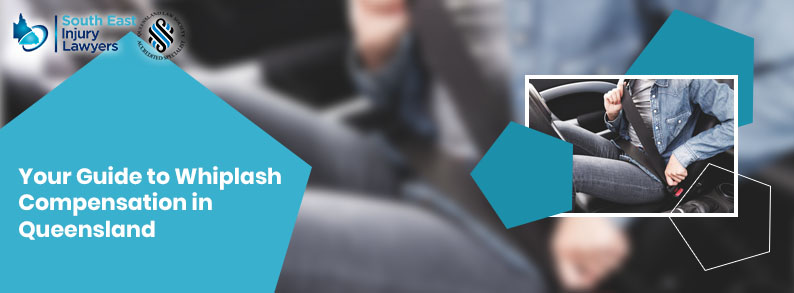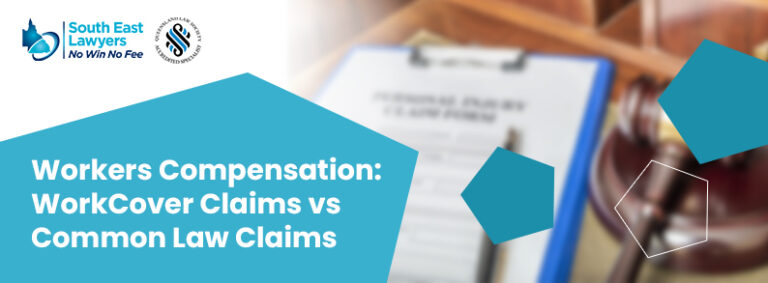Finding yourself in the aftermath of a whiplash injury is undoubtedly stressful, and the thought of pursuing a compensation claim may seem overwhelming.
However, if you’ve suffered a whiplash injury in Queensland, whether as the result of a car accident, a fall, or another type of trauma, you could be eligible for compensation.
Compensation law and claims can be complicated and difficult to navigate which is why we’ve put together a guide to whiplash compensation in Queensland.
From understanding the nature of whiplash to gathering evidence and seeking legal assistance, we break it down into manageable sections, ensuring you have the knowledge and confidence to pursue your whiplash claim effectively.
What is whiplash and how is it caused?
Whiplash is a common injury that occurs due to a sudden jolting motion of the head and neck, typically caused by a car accident or any incident that involves a sudden impact or collision.
It’s most well-known for occurring when a vehicle is hit from behind, resulting in the rapid forward and backward movement of the head. The movement resembles the cracking of a whip which is how the condition got its name.
However, whiplash can also be caused by other significant trauma and impact, like from a physical assault, a slip or fall, or even contact sports.
Whiplash primarily affects the soft tissues in the neck, including the muscles, ligaments, and tendons.
What are the symptoms of whiplash?
The symptoms of whiplash can vary from person to person but commonly include neck pain, stiffness, headaches, dizziness, and restricted neck movement.
In some cases, individuals may also experience shoulder pain, back pain, tingling sensations, or difficulty concentrating.
It’s crucial to seek medical attention promptly following a suspected whiplash injury, as early diagnosis and treatment can significantly improve the chances of a full recovery and potentially prevent future issues from occurring too.
How long does whiplash last?
Whiplash is an injury that affects individuals differently, and the duration of symptoms can vary from person to person.
In general, most people experience an improvement in their whiplash symptoms within a few weeks to a few months. However, some individuals may continue to experience lingering symptoms for several months or even longer.
It’s important to note that the severity of the whiplash injury can impact the recovery timeline. Mild cases of whiplash may resolve relatively quickly with rest, over-the-counter pain medications, and physical therapy exercises. However, more severe cases of whiplash that involve significant tissue damage or complications may require a longer recovery period.
Any kind of injury can affect people differently and it’s important to keep in mind that a wide range of factors influences the effects on each person. A person’s build and the type of accident that caused the whiplash injury could impact how long it lasts from person to person.
As we mentioned above, if you have sustained an injury or suspect that you have, medical attention is very important.
Can whiplash cause other issues?
Yes, it’s possible that whiplash could lead to other issues. Whiplash predominantly involves neck pain and discomfort; however, other areas of the body could be affected, and whiplash could have a broad impact on a person’s overall well-being.
Some of the additional issues that can arise from whiplash include:
- Headaches: Whiplash can trigger frequent headaches, ranging from tension headaches to migraines, due to the strain placed on the neck muscles and the associated nerve sensitivity.
- Shoulder and Upper Back Pain: The forceful movement of the head and neck during a whiplash injury can also lead to shoulder and upper back pain. The trauma can strain the muscles and ligaments in these areas, causing discomfort and limited mobility.
- Dizziness: Whiplash can disrupt the vestibular system, which is responsible for maintaining balance and spatial orientation. This can result in feelings of dizziness, light-headedness, and even vertigo (a sensation of spinning or whirling).
- Cognitive Issues: Some individuals with whiplash may experience difficulties with concentration, memory, and cognitive processing. This can be attributed to the impact of the injury on the brain, as well as the overall physical and emotional strain.
- Psychological and Emotional Effects: Whiplash injuries can also have psychological and emotional consequences. Individuals may experience heightened anxiety, depression, irritability, or changes in mood, often stemming from the pain, limitations, and disruption to their daily lives.
If you’ve experienced a whiplash injury and you think it could be impacted other parts of your body or areas of your life, we highly suggest that you seek medical treatment to give you the best chance of recovery.
Can I get compensation if I’ve suffered from whiplash?
In Queensland, whiplash is a recognized and compensable injury under the Compulsory Third Party (CTP) insurance scheme.
This means that if you sustain whiplash in a motor vehicle accident in Queensland, you may be entitled to seek compensation for your injuries and associated losses.
If you have sustained whiplash as a result of a motor vehicle accident, and another party is found to be at fault or negligent, you may be entitled to seek compensation for your injuries and related losses.
As we mentioned earlier, it’s also possible for whiplash to be caused by sudden trauma and impacts, like falls, sports related injuries and physical assaults, and depending on the circumstances of the injury, you could be eligible for compensation.
It’s best to seek legal advice before making any claims – not just to see if you’re eligible to make a claim for whiplash but also to ensure that you are getting exactly what you’re entitled to.
Can a pre-existing condition affect the eligibility for compensation for whiplash injuries?
In Queensland, Australia, having a pre-existing condition does not automatically disqualify you from seeking compensation for whiplash injuries. A pre-existing issue or condition could affect your eligibility and assessment of your claim however, a variety of factors will influence this as well. Some of these influencing factors are:
- Aggravation of Pre-existing Condition: If the whiplash injury aggravates or worsens a pre-existing condition, you may still be eligible for compensation. The key factor is establishing that the accident and subsequent whiplash injury caused a significant impact or exacerbation of your pre-existing condition.
- Causation: It’s important to establish a clear causal link between the accident and the whiplash injury, regardless of any pre-existing condition. Medical evidence and expert opinions can help demonstrate that the accident directly caused or contributed to your whiplash injury.
- Apportionment of Liability: Insurance companies may consider apportioning liability based on the extent to which the pre-existing condition and the accident contribute to your current condition. Compensation may be adjusted to reflect the pre-existing condition’s role in your injuries.
- Medical Opinions: Consulting with medical professionals who can provide expert opinions on the relationship between your pre-existing condition and the whiplash injury is crucial. Their evaluations and reports can help establish the impact of the accident on your overall condition.
- Contributory Negligence: If your pre-existing condition significantly contributes to the severity or impact of the whiplash injury, the compensation amount may be reduced. Insurance companies may argue that your pre-existing condition played a role in the damages suffered.
It’s important to remember that a pre-existing condition doesn’t automatically mean you aren’t entitled to compensation. Talking to a compensation lawyer can help you to understand whether you’re able to make a claim.
What kinds of compensation can I get for whiplash in Queensland?
When it comes to compensation for whiplash in Queensland, Australia, several factors can influence the amount you may be able to claim.
These factors include the severity of your whiplash injury, the impact on your daily life, and the extent of your financial losses.
Typically, compensation for whiplash will include:
- Medical Expenses: This includes the cost of medical consultations, diagnostic tests, medication, rehabilitation, and any ongoing treatments required for your whiplash injury.
- Pain and Suffering: You may be eligible to claim compensation for the physical pain, emotional distress, and diminished quality of life caused by your whiplash injury.
- Loss of Income: If your whiplash injury prevents you from working, you may be able to claim compensation for lost wages, including both past and future income loss. This can include any impact on your ability to perform your job, reduced working hours, or even a complete inability to work.
- Rehabilitation and Care Costs: If you require specialized rehabilitation services, therapies, or in-home care due to your whiplash injury, you may be able to claim compensation for these expenses.
- Out-of-Pocket Expenses: This covers any additional expenses directly related to your whiplash injury, such as travel costs for medical appointments, modifications to your home or vehicle, or necessary aids and equipment.
To make sure you’re getting the maximum whiplash compensation you could be eligible for, you should seek legal advice from an experienced compensation lawyer. It’s also important to work with a compensation lawyer who is experienced in your part of the country as the rules and requirements may change on a state-by-state basis.
How do you make a claim for whiplash compensation?
To make a whiplash claim in Queensland, Australia, there are several practical steps you can follow:
Seek Medical Attention
It’s important to seek medical attention promptly after a whiplash injury. A healthcare professional can assess your condition, provide appropriate treatment, and document your injuries, which will be crucial for your claim.
Report the Incident
Report the accident to the police and your insurance company as soon as possible. Provide accurate details of the incident, including the location, date, time, and parties involved.
Gather Evidence
Collect evidence to support your claim. This can include photographs of the accident scene, damage to the vehicles involved, and visible injuries. Also, keep records of medical reports, prescriptions, treatment receipts, and any other relevant documents.
Keep a Pain Journal
Document your daily pain levels, symptoms, and how they affect your daily life. This journal can serve as evidence of the impact of the whiplash injury on your well-being and help support your claim.
Notify the At-Fault Party
If another party is responsible for the accident, notify them of your intention to make a whiplash claim. Obtain their contact and insurance details and provide them with the necessary information to initiate the claims process.
Consult a Compensation Lawyer
It’s advisable to consult a compensation lawyer experienced in whiplash claims in Queensland. They can guide you through the process, assess the strength of your claim, help gather evidence, and negotiate with insurance companies on your behalf.
Lodge a Compensation Claim
With the assistance of your compensation lawyer, lodge a compensation claim with the relevant insurance company. Ensure all required forms and documentation are completed accurately and submitted within the designated timeframe. The compensation lawyer you work with should help to ensure that you have all of the correct information for your claim.
How is a whiplash compensation claim evaluated by an insurance company?
Various factors will influence whether an insurance company awards whiplash compensation and many of these factors will also influence the value of the claim. Some of these influencing factors are:
- Severity of the Injury: The severity of the whiplash injury and its impact on your daily life are important factors. This includes the extent of pain, the duration of symptoms, any resulting disabilities or limitations, and the effect on your ability to work or perform daily activities.
- Medical Documentation: Insurance companies review medical records, including diagnostic reports, treatment notes, and specialist opinions. These documents help establish the nature and extent of the whiplash injury, as well as any ongoing medical needs.
- Treatment Expenses: The cost of medical treatments, therapies, medications, and rehabilitation services is considered. This includes past expenses incurred and anticipated future expenses related to your whiplash injury.
- Loss of Income: If your whiplash injury has caused a loss of income or reduced earning capacity, the insurance company will consider the impact on your ability to work. They may evaluate your pre- and post-injury earnings, work history, and supporting documentation from employers.
- Pain and Suffering: Compensation for the physical pain, emotional distress, and diminished quality of life caused by the whiplash injury may also be assessed. Insurance companies may refer to guidelines and precedents to evaluate the appropriate compensation amount.
- Comparative Cases: Insurance companies often refer to past whiplash cases with similar circumstances to determine an appropriate compensation range. These comparative cases help establish precedents and benchmarks for evaluating the value of compensation.
- Contributory Negligence: If there is evidence that you contributed to the accident or your whiplash injury, such as not wearing a seatbelt, the insurance company may reduce the compensation amount proportionally.
It’s important to note that insurance companies may have their own internal procedures and guidelines for assessing whiplash injury claims. As compensation lawyers, we’ve had plenty of experience dealing with various insurance companies and can often provide you with information regarding the nuances of insurance providers to ensure you provide all of the right information.
Are there time limits for making whiplash compensation claims?
There is a strict three-year time limit after the date of the accident that you must have commenced a claim for a whiplash injury. However, it’s advised that you make a claim sooner rather than later as the process can be long and while the injury and impact of it can be assessed more easily.
It’s possible for the onset of whiplash to occur after the initial accident, but as soon as you suspect you may be suffering from an injury, you should seek medical advice and legal advice.
How long does it typically take to resolve a whiplash compensation claim in Australia?
The time if takes to resolve a whiplash compensation claim in Queensland can vary quite a lot and is dependent on a variety of factors, like the severity of the information and the evidence of the accident or circumstances of the cause of the accident that you can provide.
Some cases may take a few months while others may take a couple of years. A compensation lawyer can provide you with guidance based on your specific circumstances, which is just another reason to seek legal advice when making compensation claims.
Do I need a lawyer to make a claim for whiplash compensation?
No. In Australia, it’s not a legal requirement to engage a lawyer to make a claim for a whiplash injury.
However, while it is not required, it is recommended because compensation law and claims processes are not easy to understand, and they require a lot of information. A compensation lawyer can help you by:
- Helping you navigate complex legal processes.
- Using their experience to make the process more efficient.
- Maximise your compensation entitlements.
- Advocating for you
All too often people underestimate their entitlements and settle for less than they deserve, however, a compensation lawyer can often get you the maximum compensation you’re entitled to and ensure that you understand all of your options in the process.
Have you suffered a whiplash injury in Queensland?
If you’ve suffered a whiplash injury and not sure if you’re eligible for compensation or you’ve started the compensation process and found it difficult to manage, get in touch with us at South East Injury Lawyers today.
Our experienced compensation lawyers have helped numerous people get the compensation they deserve, and they are ready to help you.
Based in and around the Brisbane area of Queensland, South East Injury Lawyers is here to help you today. Call us on 1300 446 999 or book a consultation online here.






